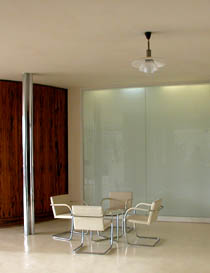
Director Jan Hřebejk is set to film an adaptation of the novel about the Tugendhat villa
 |
"I have the film rights - and how it will turn out, we will see. We would like to do it with Hřebejk, but it's a question of how, with whom, and according to what screenplay," Bierman told ČTK today (Kawasaki's Rose, A Novel for Women, Tour Participants, Shameless). They visited the Tugendhat villa. Its restoration began in February.
"Certainly a part of the story would have to be filmed directly in the villa, with the repairs expected to be completed in 2012," Bierman added. According to Hřebejk, who met Simon Mawer in Prague last week, this project is still in its infancy. "We couldn’t do without filming in the Brno villa," confirmed the director, who will begin shooting his feature film "Innocence" in August.
Mawer's novel, inspired by the true fate of the Tugendhat villa against the backdrop of the story of its owners, reflects the tragedy of the Czech nation. The house, built specifically for a Jewish-Christian newlywed couple, exudes wealth, confidence, beauty, and majesty. However, this is only until the Nazi army invades the country and the couple must leave the villa and the land. The life of the villa does not stop with the departure of its owners. It passes from one hand to another, from Czech to Nazi, then to Soviet, and eventually returns to the ownership of the Czechoslovak state. The crystalline perfection of the glass room exerts an immense gravity on everyone who gets close to it.
The author does not hide that the city in his novel is Brno and the house of Liesel and Viktor Landauer is the Tugendhat villa. His inspiration was a visit to the villa in the early 1990s. Mawer is trained as a biologist and came to Brno to see the places where the founder of genetics, Gregor Mendel, worked.
Today, the famous functionalist villa, listed as a UNESCO heritage site, was built for Grete and Fritz Tugendhat. It was designed in 1928 by the renowned German architect Ludwig Mies van der Rohe. "But I am a novelist, so apart from the house, I invented everything else, including the fates of the Landauers," Mawer told ČTK last year. "Viktor Landauer is Jewish. The Tugendhats were both Jewish. The Landauers built their house at the same time and left the country for the same reasons as the Tugendhats. But there is otherwise no connection between them," emphasized the author.
In one of the key scenes in "The Glass Room", the Landauers listen to a broadcast from the BBC of Neville Chamberlain's speech during the Munich crisis about "dispute in a distant land between peoples about whom we know nothing" and definitively decide to emigrate. "I wanted to bring a perspective from Central Europe," said Mawer, whose novel ends with an epilogue in 1990.
"I felt that was a natural ending. The house became a museum, and so life left it. It is still a beautiful building, but it is not a home. Although there is still something in it that evokes the past," said Mawer, who has been living in Italy for 30 years, where he teaches in high school.
The English translation is powered by AI tool. Switch to Czech to view the original text source.
0 comments
add comment












